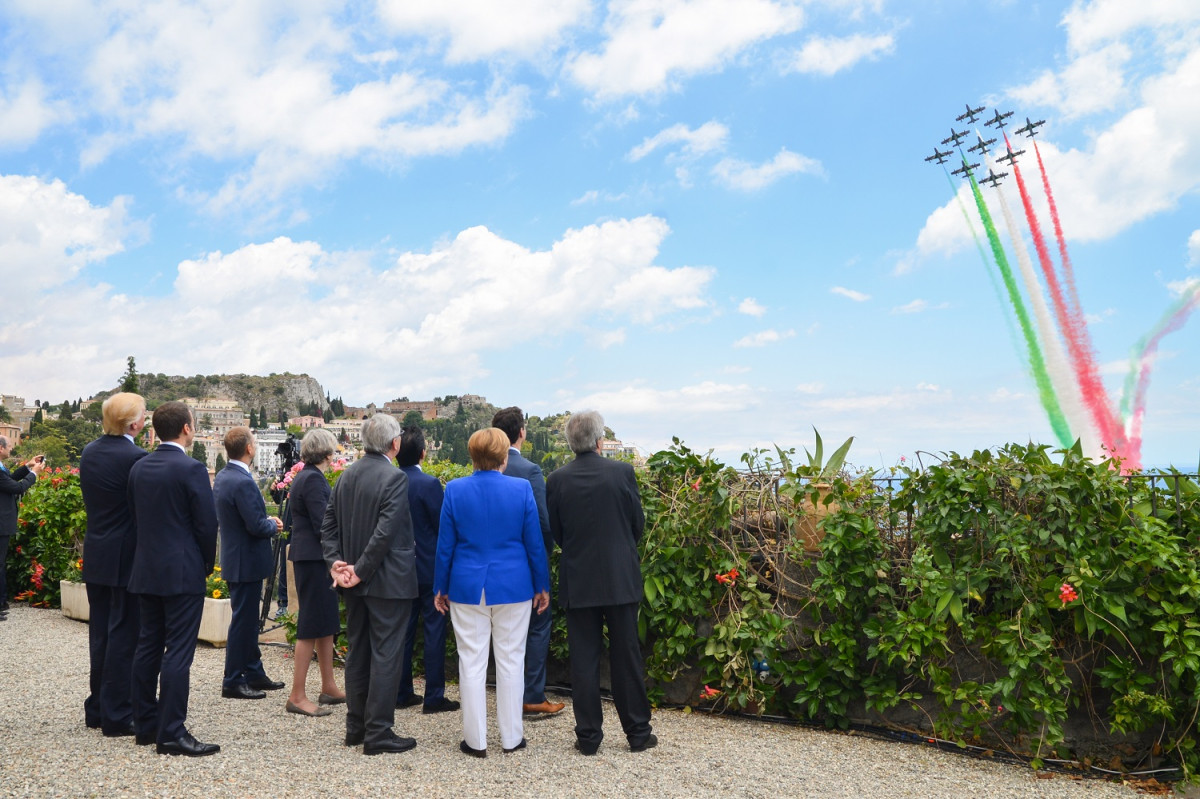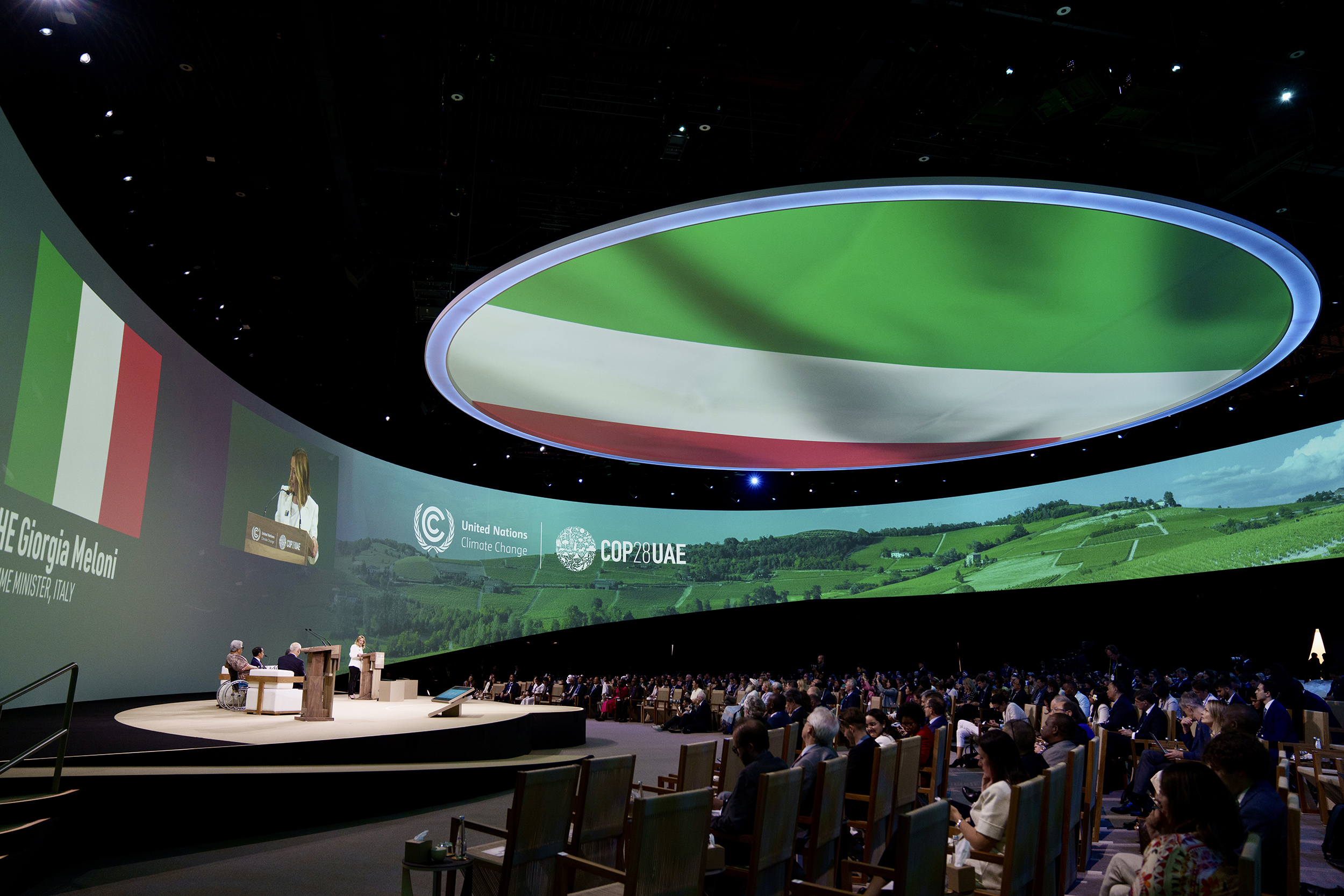Climate to become cross-cutting priority during Italy’s G7 presidency – special envoy
Clean Energy Wire: You have recently been appointed as Italy’s new climate envoy. When the government appointed you, it said Italy played a “decisive role” in international climate negotiations, also at COP28 and during the G7 presidency. What does this mean?
Francesco Corvaro: Italy’s government decided to put a special focus on climate change, and it wants to become an important player once again at the table of international climate negotiations.
At COP28, prime minister Giorgia Meloni announced Italy would contribute 100 million euros to the Loss and Damage Fund. The prime minister also authorised us to make a pledge to the Green Climate Fund. Both these contributions are important signals showing that Italy’s government is involved in international climate policy, also in view of its upcoming G7 presidency. Climate policy is something at the core of our policy making and in the heart of our prime minister.
The government appointed me as climate envoy. I am not a politician or a diplomat. I am a university professor. So, I know very well the real problem of climate change from a physics point of view, and I can explain this complex issue also within the government.
Will climate policy be one of Italy’s priorities as G7 president?
Yes, it will, but not just as a single agenda item. Instead, we want to tackle all aspects of climate change policy, be it in health, the energy sector or food. Of course, we want to wait for the results of COP28 before finalising our priorities for the G7 presidency.
Another aspect we would like to highlight in the G7 agenda is the importance of risk management and insurance connected with climate change. With increased numbers of severe weather events, insurance will become more expensive – if it is available at all, in particular in developing countries.
Then we have a lot of issues that are not directly connected to climate change, but are affected by climate change.
CLEW Guide – Italy moves on green transition, but fossil ties remain tight
One of those issues is probably energy security. Prime minister Meloni has said that energy security will also feature high on your country’s G7 presidency agenda. What could Italy and the G7 do in your opinion to ensure energy security?
Energy security is a tough issue, also because its implications are different in each country.
Italy considers energy security achievable in different ways. First of all, we would like to invest in renewable energies, which we see as crucial to building a secure system. We are backing the goal of tripling renewables capacity by 2030 and doubling energy efficiency improvements.
At the same time, we know that a balanced grid requires resources that are not affected by the presence or absence of sunshine or wind. As an engineer, I see two possibilities: first, fossil fuels, and in Italy’s case especially natural gas. Here, our government aims to invest in CO2 capture research and development.
Also for energy?
Yes, also for energy. This is crucial to remain able to use natural gas for a short, medium or even longer period.
The second option is nuclear energy. We have no other choice from a technical point of view. It is not a political problem.
Of course, it is important to have a mix of all options. The Ukraine crisis made us understand that it is not a good idea to focus on one fuel only, we have to diversify to reduce the risks. Italy has no natural resources except sunshine and wind, but it has a lot of protected historic architectural sites and natural parks, which makes expansion difficult.
Italy closed its last nuclear power plant in the 1980s. Are there plans to re-enter the technology?
Today, we participate in the alliance for nuclear energy as an observer under a statement of our parliament. The aim is to enable research in this field, in fusion, small modular reactors. The next step that our energy minister Gilberto Pichetto Fratin wants to bring to the attention of the government is the possibility to build new nuclear power installations. We are discussing which kind this could be. Small modular reactors could be the first step towards restarting nuclear energy, because it can be paid for by the private sector. Think about an industrial district that could decide to produce its own electricity.
For sure, the time is ripe to reopen this discussion. The decision to exit the technology after Chernobyl was made the under the influence of a big disaster, but nuclear energy is one of the safest ways of energy production we have.
What about the timeframe? Can nuclear play a role in climate action today? Science says emissions must be halved by 2030.
It should be possible to install a nuclear energy system in 7-10 years. So, obviously, this is not an overnight solution. However, if you asked me to sign an agreement today with the target of reaching net zero emissions by 2050, I could do so only if nuclear energy can be used. In the future, we might have other technologies, of course.
For the immediate future, we have natural gas. And here, we can improve the use of CO2 storage.
There are issues with CCS, too. It takes a long time to set up a system and it is expensive.
I know. CCS is something that is not completely ready, but in addition to efficiency to reduce the overall use of energy, this is the path we have to pursue. We have no other possibility with today’s technologies.
Italy is putting a big focus on cooperation with Africa. Will this be part of the G7 priorities?
Yes, it will be.
Q&A – CCS makes comeback as Germany and the EU strive for climate neutrality
Germany maintains climate focus as war against Ukraine dominates G7 summit agenda
In connection to this, Italy plans to soon present the “Mattei Plan”. Can you explain what it is?
Enrico Mattei [founder of state-controlled oil and gas major Eni] for a long time lived in my region. His idea was that if we want to solve problems in developing countries in a sustainable way, they do not need charity. They need to be supported to master the requisite technologies, for example to help them build up a good agricultural or industrial system.
One of the main building blocs of the plan is energy, but that is not the only one – the idea is to help countries develop in a sustainable way across the board. One example of the Mattei Plan would be a big project with Tunisia, where their farmers and our farmers cooperate on the issue of food security. Other examples for cooperation under the plan are on renewable energies, reducing methane emissions or on climate change adaptation.
The idea is not to enter as a conqueror. Mattei understood that Africa and Italy – and Europe – are connected through shared interests. Improving the situation in Africa is in the interest of Europe.
Are all these also connected to Italy’s role or future role as an energy hub in the Mediterranean?
Yes. Italy aims to be an electricity and gas hub. For now, it is obviously natural gas, but in the future we are looking at hydrogen or the transfer of CO2 through pipelines. We would have gas arrive from Africa, and CO2 sent to Africa.
Italy currently focuses very much on natural gas. At the same time, you are here as the climate envoy at a climate conference. How do these fit together?
When Italy decided to exit nuclear power in the late 1980s, we needed other ways to produce electricity. We started to use oil and coal, but we did not have domestic reserves. So, we started the first energy transition, converting everything to natural gas.
Now, while nuclear energy in my view is the only way to arrive at net zero emissions by 2050, we have natural gas as a transitional fuel. With renewable energy we are not able to cover everything. And batteries are also a problem, because building them requires large amounts of energy and rare earths, which often come from China. We do not have enough material to build the battery storage capacity necessary to complement wind and solar energy.
Italy’s idea is to increase the use of renewables and at the same time decrease the use of natural gas. Also, by 2025, we stop all coal use in Italy.

If you decrease gas use, why are new partnerships with African countries necessary?
The idea is to build the pipeline connections which now transport gas, but in the future this would be hydrogen. African countries could produce renewable energy, use whatever they need for themselves and the rest to produce hydrogen to export to Europe. So, the partnership with Africa is not only on fossil fuels – the idea is to reduce these and increase renewables.
African countries need funds to invest in the transition, but many of them are in debt. Is debt cancellation or relief part of the G7 presidency’s plans?
This is a difficult question. I understand that our prime minister plans to invite a representative from the African region to the G7 to discuss the problem. Alone, we are not able to solve this.
We would like to create a connection with the private sector on this issue, to generate investments. This is something we need to discuss in the G7.
When can we expect Italy’s government to present its priorities for the G7 presidency?
Early next year, most likely. For the climate aspects, we will wait for the final results of COP28.

